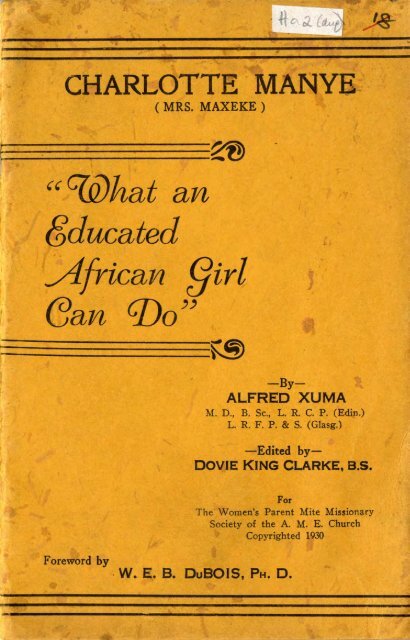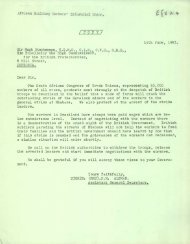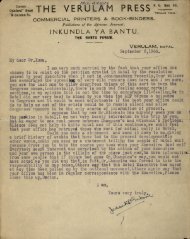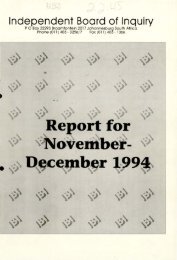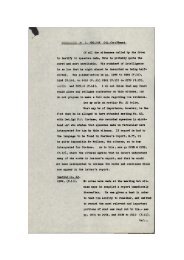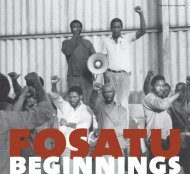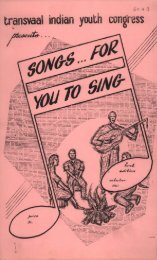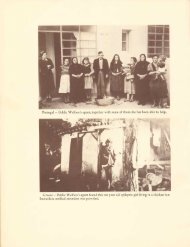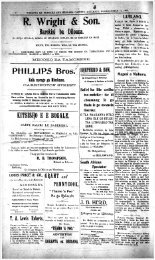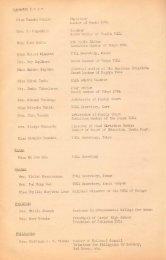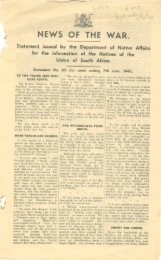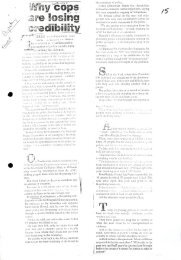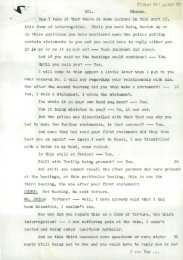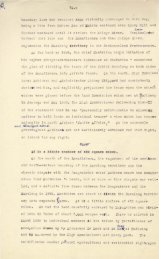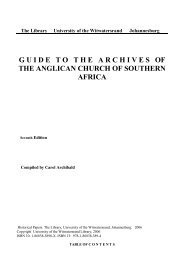AD2186-Ha2-01-jpeg.pdf - Historical Papers - University of the ...
AD2186-Ha2-01-jpeg.pdf - Historical Papers - University of the ...
AD2186-Ha2-01-jpeg.pdf - Historical Papers - University of the ...
You also want an ePaper? Increase the reach of your titles
YUMPU automatically turns print PDFs into web optimized ePapers that Google loves.
CHARLOTTE MANYE<br />
( MRS. MAXEKE )<br />
" R&kat an<br />
Educated<br />
^African Cfirl<br />
Gan
CHARLOTTE<br />
( Mrs. Maxeke )<br />
MAN\E<br />
uClo)hat ^An Educated<br />
^African §irl Gan ^Do"<br />
- By - f<br />
Alfred B. Xuma, M. D., B. Sc., L R.C.P., (Edin) [<br />
L. R. F. P. & S. (Glasg )<br />
Foreword by<br />
W. E. Burghardt DuBois, Ph. D.<br />
Edited by<br />
Dovie King Clarke, S.<br />
for<br />
The Women's Parent Mite Missionary Society<br />
<strong>of</strong> <strong>the</strong> A. M. E. Church<br />
Copyrighted 1930
CHARLOTTE MANYE<br />
upon her graduation from Wilberforce <strong>University</strong> in 19<strong>01</strong><br />
at <strong>the</strong> completion <strong>of</strong> ten years' schooling by <strong>the</strong> women <strong>of</strong><br />
<strong>the</strong> Third District.
CHARLOTTE MANYE MAXEKE<br />
take upon her first visit back to <strong>the</strong> United States as a<br />
guest <strong>of</strong> <strong>the</strong> Women's Parent. Mite Missionary Society<br />
in 1928.
Preface<br />
The following pages are in no sense intended<br />
to be a biography <strong>of</strong> our subject "Charlotte", Mrs.<br />
Charlotte Manye Maxeke. She is used only as an<br />
argument for higher education <strong>of</strong> our African women.<br />
She is <strong>the</strong> first woman <strong>of</strong> our race in South<br />
Africa to hold a college degree. Her education<br />
translated into service for humanity has been a<br />
blessing and a God-send for our people and for<br />
better race relations in South Africa.<br />
Should this sketch arouse interest in <strong>the</strong> education<br />
<strong>of</strong> African women and <strong>of</strong>fer <strong>the</strong>m facilities<br />
in after life to enable <strong>the</strong>m to work among <strong>the</strong>ir<br />
sisters and <strong>the</strong>reby spread <strong>the</strong> spirit <strong>of</strong> service and<br />
leadership, it will have served its purpose.<br />
May each reader be inspired to work spiritually<br />
and materially for <strong>the</strong> redemption <strong>of</strong> <strong>the</strong> African,<br />
—body, mind, and soul.<br />
A. B. XUMA<br />
Johannesburg, S. A.
Foreword<br />
New York, August 28, 1930.<br />
I have known Charlotte Manye Maxeke since<br />
1894 when I went to Wilberforce <strong>University</strong> as a<br />
teacher. She was one <strong>of</strong> three or four students<br />
from South Africa, and was <strong>the</strong> only woman. She<br />
was especially <strong>the</strong> friend <strong>of</strong> Nina Gomer, <strong>the</strong> student<br />
who afterward became my wife. We were<br />
interested in Charlotte Manye because <strong>of</strong> her clear<br />
mind, her fund <strong>of</strong> subtle humor, and <strong>the</strong> straightforward<br />
honesty <strong>of</strong> her character. She was having<br />
difficulties with language and <strong>the</strong> new environment,<br />
but she did her work with a slow, quiet determination<br />
that augured well for her future. Since<br />
<strong>the</strong>n, and at long intervals, I have had <strong>the</strong> opportunity<br />
<strong>of</strong> following her work through <strong>the</strong> glimpses<br />
which I have had from far-<strong>of</strong>f South Africa. I<br />
regard Mrs. Maxeke as a pioneer in one <strong>of</strong> <strong>the</strong><br />
greatest <strong>of</strong> human causes, working under extraordinarily<br />
difficult circumstances to lead a people,<br />
in <strong>the</strong> face <strong>of</strong> prejudice, not only against her race,<br />
but against her sex. To fight not simply <strong>the</strong> natural<br />
and inherent difficulties <strong>of</strong> education and social<br />
uplift, but to fight with little money and little<br />
outside aid was indeed a tremendous task. I think<br />
that what Mrs. Maxeke has accomplished should<br />
encourage all men, and especially those <strong>of</strong> African<br />
descent. And in addition to that, it should<br />
inspire <strong>the</strong> white residents <strong>of</strong> South Africa and <strong>of</strong><br />
America to revise <strong>the</strong>ir hastily-made judgments<br />
concerning <strong>the</strong> possibilities <strong>of</strong> <strong>the</strong> Negro race.<br />
w. E. B. DUBOIS.<br />
#
Charlotte Manye (Maxeke)<br />
or<br />
WHAT AN EDUCATED AFRICAN GIRL CAM<br />
DO<br />
Biographers, in whose society and group, thank<br />
God, I do not belong, are usually great enthusiasts<br />
about <strong>the</strong>ir subjects. Being artists <strong>the</strong>y <strong>of</strong>ten<br />
create hero and heroine ra<strong>the</strong>r than relate true<br />
history and activity. They polish and gloss over<br />
<strong>the</strong> rough edges; <strong>the</strong>y are sometimes so successful<br />
in <strong>the</strong>ir art, creating a picture or image which<br />
though perfect is so unlike <strong>the</strong> subject that he almost<br />
fails <strong>of</strong> recognition by those who knew him<br />
in life, and if living, himself is urged to ask, "Whose<br />
life is this? Is this my life story?" Now I feel<br />
myself lacking in this creative quality as well as<br />
in <strong>the</strong> desire to make a heroine. I shall only attempt<br />
to record, for <strong>the</strong> benefit <strong>of</strong> her friends and<br />
admirers, and enemies as well, this brief sketch<br />
and outline <strong>of</strong> <strong>the</strong> life story <strong>of</strong> Charlotte Manye<br />
Maxeke.<br />
Now known, appreciated, and admired in three<br />
continents by different racial groups, "Charlotte"<br />
Manye was born at Fort Beaufort, Cape Province,<br />
South Africa. A Basuto woman by nationality<br />
but born among <strong>the</strong> Xosa tribes. Through her<br />
mo<strong>the</strong>r, a Xosa woman, she had already acquired<br />
a strong blood bond with those people. This blood<br />
tie was to be made stronger later by her marriage<br />
to one Marshall M. Maxeke, a young Xosa whom<br />
Povidence had ordained in His mysterious ways<br />
to meet Charlotte and study with her in <strong>the</strong> far<br />
<strong>of</strong>f Wilberforce <strong>University</strong>, U. S. A.<br />
There is <strong>of</strong>ten nothing strange or extraordinary<br />
about one's birth or birth place. It usually
is like o<strong>the</strong>r birth days or is <strong>the</strong> birth place <strong>of</strong> many<br />
o<strong>the</strong>rs. However, it is <strong>of</strong> great importance to note<br />
that Charlotte's fa<strong>the</strong>r had come down from <strong>the</strong><br />
Transvaal to <strong>the</strong> Cape Province for <strong>the</strong> sole purpose<br />
<strong>of</strong> buying guns with which to fight <strong>the</strong> Boers.<br />
However, as <strong>the</strong> songster says, "Great and marvellous<br />
are thy works, Lord God Almighty." This<br />
man was himself shot down by <strong>the</strong> "Big Gun/' <strong>the</strong><br />
Word <strong>of</strong> God. This changed his mission and also his<br />
outlook upon life. It was a warrior who went out to<br />
arm himself for war and <strong>the</strong> destruction <strong>of</strong> human<br />
life, but returned a messenger <strong>of</strong> peace and goodwill:<br />
At <strong>the</strong> Cape he had heard, learned, and believed that<br />
"Blessed are <strong>the</strong> peacemakers, for <strong>the</strong>y shall be<br />
called <strong>the</strong> children <strong>of</strong> God." He had been born<br />
again.<br />
This change <strong>of</strong> mission, <strong>of</strong> outlook, was going<br />
to have a tremendous influence over <strong>the</strong> new family<br />
life. The children had to be led through <strong>the</strong> paths<br />
<strong>of</strong> peace into light and fullness <strong>of</strong> life. Charlotte,<br />
with her sister, <strong>the</strong>n entered <strong>the</strong> mission school <strong>of</strong><br />
<strong>the</strong> Congregational Church at Uitenhage. Later<br />
<strong>the</strong> family moved to Port Elizabeth where she<br />
continued her education. It was here that she<br />
began to show some buds <strong>of</strong> vocal musical talents.<br />
Begins Musical Career<br />
Later she went to Kimberley to teach in a<br />
Weslyan School. It was <strong>the</strong>re that <strong>the</strong>se buds <strong>of</strong><br />
musical talent attracted <strong>the</strong> attention <strong>of</strong> music<br />
lovers among both races. Some enterprising white<br />
people, with artistic temperament, who had come<br />
to Kimberley in search <strong>of</strong> diamonds, now discovered<br />
a new and undreamed <strong>of</strong> diamond,—Africa's own<br />
riches in <strong>the</strong> beautiful contralto voice <strong>of</strong> Charlotte<br />
Manye. Her voice was successfully trained by a<br />
competent artist. The bud <strong>of</strong> musical talent that
appeared at Port Elizabeth had now. under <strong>the</strong><br />
care <strong>of</strong> an expert florist, blossomed into a beautiful<br />
flower with its aroma. It was as though one <strong>of</strong><br />
those large, blue, precious stones from <strong>the</strong> sands<br />
<strong>of</strong> Kimberley had been washed, cut, and polished<br />
by an expert diamond cutter until its radiance made<br />
<strong>the</strong> darkest night brighter than <strong>the</strong> light <strong>of</strong> <strong>the</strong><br />
moon and all <strong>the</strong> stars in a cloudless wintry night.<br />
Charlotte had now become <strong>the</strong> idol <strong>of</strong> music lovers<br />
in <strong>the</strong> Town Hall at Kinberley. It was her talent<br />
that inspired J. H. Balmer, R. A. M., Blackpool,<br />
England, to organize and train a group <strong>of</strong><br />
young men and women for a two years' concert<br />
tour in British Isles. Charlotte was among <strong>the</strong><br />
group. So successful were <strong>the</strong>ir performances<br />
that <strong>the</strong>y had <strong>the</strong> unique experience <strong>of</strong> singing<br />
before <strong>the</strong> late Queen Victoria and o<strong>the</strong>r members<br />
<strong>of</strong> <strong>the</strong> Royal Family, who enjoyed <strong>the</strong>ir rendering<br />
<strong>of</strong> English songs and still more particularly <strong>of</strong> <strong>the</strong><br />
native compositions set to more or less traditional<br />
tunes. They returned home to South Africa after<br />
spending two years in <strong>the</strong> British Isles. Their<br />
stay was to be very short. They had made an<br />
experiment; it had been successful beyond anyone's<br />
dreams. They must repeat or excel it; consequently,<br />
after fur<strong>the</strong>r training and perhaps some<br />
reorganization <strong>the</strong>y were <strong>of</strong>f again. This time not<br />
to <strong>the</strong> British Isles alone but <strong>the</strong>ir tour was to<br />
include Canada and <strong>the</strong> United States <strong>of</strong> America.<br />
Reverdy Ransom and Charlotte's Future<br />
It was in <strong>the</strong> United States that things were<br />
to take a turn and a sudden turn at that. Charloti<br />
with <strong>the</strong> rest <strong>of</strong> <strong>the</strong> troop, six persons in all, met<br />
with Rev. R. C. Ransom, later Bishop Ransom, at<br />
Cleveland, Ohio. A vision at once flamed into Mr.<br />
Ransom's mind. He asked <strong>the</strong>m if <strong>the</strong>y did not<br />
want an education. They were eager for it. He at
once telegraphed Bishop Arnett who relayed a<br />
message <strong>of</strong> consent and instructions to <strong>the</strong> <strong>the</strong>n<br />
Secretary <strong>of</strong> Missions <strong>of</strong> <strong>the</strong> A. M. E. Church, Dr.<br />
Benjamin Derrick, to make arrangements for <strong>the</strong>m<br />
to enter Wilberfoce <strong>University</strong> at Wilberforce,<br />
Ohio.<br />
At New York<br />
When <strong>the</strong>y arrived in New York, Dr. Derrick<br />
had all <strong>the</strong> arrangements complete for <strong>the</strong>m to enter<br />
school. He saw <strong>the</strong> manager and chaperone <strong>of</strong><br />
<strong>the</strong> troupe, but <strong>the</strong>y could not consent as <strong>the</strong>y were<br />
responsible to <strong>the</strong> parents for <strong>the</strong> return <strong>of</strong> <strong>the</strong>ir<br />
children. Dr. Derrick was intent on making use<br />
<strong>of</strong> his God-given opportunity; so he "kidnapped"<br />
Charlotte, a consenting party, and despatched her<br />
to Wilberforce where she was received temporarily<br />
as one <strong>of</strong> <strong>the</strong> family in Bishop Arnett's home. Later<br />
she was adopted by <strong>the</strong> Third Episcopal District<br />
as <strong>the</strong>ir African daughter.<br />
Years before, Bishop Payne had dreamed that<br />
<strong>the</strong> best thing <strong>the</strong> church could do would be to<br />
bring Africans to America to educate and train<br />
<strong>the</strong>m and <strong>the</strong>n send <strong>the</strong>m back among <strong>the</strong>ir people<br />
in Africa to spread Christianity and education. This<br />
was <strong>the</strong>n <strong>the</strong> fulfillment <strong>of</strong> Bishop Payne's dream<br />
visualized in <strong>the</strong> alert mind <strong>of</strong> Rev. Ransom, telegraphed<br />
to Bishop Arnett who at once instructed<br />
Dr. Derrick to complete arrangement for <strong>the</strong> education<br />
<strong>of</strong> <strong>the</strong>se Africans. So was translated this dream<br />
into fact and practice. Charlotte's education and<br />
future service were to be <strong>the</strong> true fulfillment <strong>of</strong><br />
this dream.<br />
Abandons Music For Lecturing<br />
My information as to what "Charlotte's" activities<br />
were in school is ra<strong>the</strong>r limited. Whe<strong>the</strong>r<br />
she was a poor or a good student only her former
schoolmates and teachers would know. However,<br />
I learn that she abandoned music for lecturing on<br />
conditions in South Africa and <strong>the</strong> necessity <strong>of</strong> extending<br />
<strong>the</strong> Church's work into that part <strong>of</strong> <strong>the</strong><br />
world. Thus she made friends for herself and for<br />
<strong>the</strong> cause in Africa. Judging by her manifest ability,<br />
under difficulties in later life, one may risk <strong>the</strong><br />
danger <strong>of</strong> forming judgment upon insufficient evidence<br />
and say she must have been above <strong>the</strong> average<br />
as a student. In Government examinations in<br />
South Africa, she has always stood in first grade<br />
in <strong>the</strong> list <strong>of</strong> successes.<br />
From Wilberforce Back to Africa<br />
In 19<strong>01</strong> she returned to South Africa with one<br />
Dr. Attaway and o<strong>the</strong>rs, leaving behind her future<br />
better half, Marshall Macdonald Maxeke, who was<br />
to graduate in 1903 and also <strong>the</strong>ir devoted and lifelong<br />
friend, James Yapi Tantsi, who was to graduate<br />
four years later. This separation was only<br />
temporary; <strong>the</strong> trio was to rejoin and co-operate<br />
in a life long effort to give roots to <strong>the</strong> work <strong>of</strong> <strong>the</strong><br />
African Methodist Church in South Africa.<br />
In South Africa Again<br />
Her arrival in South Africa was coincident<br />
with <strong>the</strong> troublous days <strong>of</strong> <strong>the</strong> Anglo-Boer War.<br />
The country was under marshall law; consequently<br />
she could not rejoin her family in <strong>the</strong> Transvaal<br />
at <strong>the</strong> time. She had no time to waste. Imbued<br />
with <strong>the</strong> spirit <strong>of</strong> service, she had a message because<br />
she had a mission. She was <strong>the</strong>refore at<br />
once busy about her Master's work. She began<br />
organizing <strong>the</strong> Women's Mite Missionary Society<br />
for <strong>the</strong> church under <strong>the</strong> <strong>the</strong> <strong>the</strong>n presiding Bishop,<br />
Levi Coppin, in <strong>the</strong> Cape Province.
At Pietersburg<br />
As soon as peace was restored Bishop Coppin<br />
sent Charlotte Manye to her people at Pietersburg.<br />
Here, says she, were found seven members <strong>of</strong> <strong>the</strong><br />
African Methodist Episcopal Church. In <strong>the</strong> Chief's<br />
household <strong>of</strong> two hundred fifty members, <strong>the</strong>re was<br />
only one Christian convert, a woman named Selina.<br />
These people were under a deacon who held this<br />
high <strong>of</strong>fice only because in <strong>the</strong> land where all are<br />
blind, a one-eyed man is king.<br />
The chief's household was <strong>the</strong> hardest barrier<br />
to overcome; it was <strong>the</strong> "wall <strong>of</strong> Jericho". She<br />
must break through it before <strong>the</strong> common African<br />
people can feel free to follow her lead. They must<br />
get a mandate from members <strong>of</strong> <strong>the</strong> Royal family<br />
by example. However, she got busy; organized<br />
Christian Endeavor societies; built up and led a<br />
class <strong>of</strong> eighty members divided into four groups <strong>of</strong><br />
her own converts. She opened a school and a<br />
night school for <strong>the</strong> herd boys. Thereafter every<br />
Sunday <strong>the</strong>y had accessions.<br />
Rejoined by Her Future Husband and Married<br />
At <strong>the</strong> following conference Bishop Coppin<br />
appointed <strong>the</strong> young Rev. M. M. Maxeke, recently<br />
returned from Wilberforce <strong>University</strong> to this place.<br />
His fiance' had already laid a foundation for him,<br />
a broad and a firm foundation at that. He already<br />
had a church life to enter into because <strong>the</strong> first<br />
quarter he baptized eighty-five members, converts<br />
<strong>of</strong> Charlotte and <strong>the</strong> deacon. They had won <strong>the</strong>mselves<br />
a place in <strong>the</strong> heart <strong>of</strong> <strong>the</strong> community as<br />
well as <strong>the</strong> church at large.<br />
Beginnings <strong>of</strong> Wilberforce Institute, South Africa<br />
The church so appreciated <strong>the</strong>ir work and effort<br />
that it was decided to transfer <strong>the</strong> school to Evaton,
where <strong>the</strong> work was taken over by <strong>the</strong> Tantsi broth-<br />
Lillian Derrick, at which time <strong>the</strong> Maxekes took<br />
ers. It was <strong>the</strong>n called <strong>the</strong> Lillian Derrick Institute.<br />
Perhaps this bait did not catch any fish; consequently<br />
<strong>the</strong> name was modified and called Wilberforce<br />
<strong>the</strong> work upon <strong>the</strong> solid foundation laid by <strong>the</strong><br />
Tantsi bro<strong>the</strong>rs. The school is now called simply<br />
Wilberforce Institute, Evaton.<br />
At Klerksdorp<br />
From Evaton <strong>the</strong>y were sent to Klerpsdorp where<br />
<strong>the</strong>y labored for two years. Here she had as one<br />
<strong>of</strong> her pupils a boy who is now one <strong>of</strong> South Africa's<br />
leading medical practitioners <strong>of</strong> any race.<br />
Call to <strong>the</strong> Transkei Territories<br />
It is during <strong>the</strong> short stay at Klepksdorp that<br />
<strong>the</strong>y received a call to Idutywa to take charge <strong>of</strong><br />
a private school. To <strong>the</strong>m <strong>the</strong> call was great; it<br />
<strong>of</strong>fered an opportunity for larger service because<br />
<strong>the</strong> people surrounding <strong>the</strong> territory were backward.<br />
Here again <strong>the</strong>y did not bury <strong>the</strong>ir talent.<br />
They used it and brought it back with interest to<br />
<strong>the</strong>ir Master.<br />
Called by Paramount Chief Dalindyebo <strong>of</strong> <strong>the</strong><br />
Tembus<br />
So successful was <strong>the</strong>ir work in this private<br />
school that it attracted <strong>the</strong> attention <strong>of</strong> Dalindyebo<br />
(Make riches), Paramount Chief <strong>of</strong> <strong>the</strong> Batembu.<br />
He sent for "Charlotte", now Mrs. Maxeke, with<br />
her husband to come and take charge <strong>of</strong> his private<br />
school at a place called Tyalara. It is true that<br />
during this period <strong>the</strong> Rev. Marshall Macdonald<br />
Maxeke had resigned active pastorate to do educational<br />
work. It is not true, however, as we are<br />
sometimes made to understand, that <strong>the</strong>y left <strong>the</strong>
church. During this period <strong>the</strong>y served <strong>the</strong> church,<br />
not from <strong>the</strong> pulpit, but in <strong>the</strong> pews under <strong>the</strong><br />
leadership <strong>of</strong> that courageous, steadfast, and venerable<br />
old man. Fa<strong>the</strong>r Rev. Z. Tantsi, <strong>the</strong> fa<strong>the</strong>r <strong>of</strong><br />
our well known and loyal son and follower in <strong>the</strong><br />
fa<strong>the</strong>r's foot-steps, <strong>the</strong> Rev.James Yapi Tantsi, D.D.<br />
O<strong>the</strong>r leaders with whom <strong>the</strong>y served at this time<br />
were Revs. Mtshwelo and Taho.<br />
It was during this time that Mrs. Charlotte<br />
Maxeke became endeared and ingratiated to <strong>the</strong><br />
whole tribe <strong>of</strong> <strong>the</strong> Tembus. I have <strong>of</strong>ten heard<br />
my fa<strong>the</strong>r speak <strong>of</strong> her courage and eloquence, she<br />
being one <strong>of</strong> <strong>the</strong> few women whose voice was heard<br />
in <strong>the</strong> chief's court among men and who had influence<br />
in council. So far as African native life<br />
and custom are concerned, this alone speaks volumes<br />
for her ability and is really a mark <strong>of</strong> distinction.<br />
She was here given <strong>the</strong> name Nogazo as<br />
salutation.<br />
Mrs. Maxeke's health began to decline during<br />
<strong>the</strong>ir stay at Chief Dalindyebo's school. They were<br />
forced to return to <strong>the</strong> Transvaal in Johannsburg<br />
where "Charlotte' resumed her former work and<br />
activities in church matters as President <strong>of</strong> <strong>the</strong><br />
Women's Mite Missionary Society, now Woman's<br />
Home and Foreign Missionary Society. Her training<br />
and experience naturally put her at <strong>the</strong> head<br />
<strong>of</strong> things unrivalled. I do not mean to say <strong>the</strong>re are<br />
no people who envy her in this position <strong>of</strong> power<br />
and leadership. Their only motive is envy, and<br />
<strong>the</strong>ir position is that <strong>of</strong> a dog which chases a horse<br />
<strong>of</strong>f <strong>the</strong> grass even though he cannot eat <strong>the</strong> grass.<br />
A deplorable state <strong>of</strong> affairs, but bitter truth which<br />
must be acknowledged. Envious <strong>of</strong> superior abilities,<br />
<strong>of</strong>ten our people will try to thwart <strong>the</strong> efforts<br />
<strong>of</strong> able leadership, even to <strong>the</strong> point <strong>of</strong> defeating<br />
<strong>the</strong>ir own best interests.
At Johannesburg<br />
She is busy both in church work and in social<br />
service. She acts as chaplain <strong>of</strong> <strong>the</strong> four women's<br />
prisons, coming into contact with women <strong>of</strong> all<br />
denominations as well as non church members.<br />
Many converts are made through her human touch<br />
and sympa<strong>the</strong>tic treatment. Through her influence<br />
many have been brought into <strong>the</strong> A. M. E.<br />
Church. Besides being <strong>the</strong> leader <strong>of</strong> <strong>the</strong> women<br />
in missionary circles, Mrs. Maxeke is <strong>the</strong> best<br />
known and most active member <strong>of</strong> <strong>the</strong> A. M. E.<br />
Church in public affairs. She is a member <strong>of</strong> several<br />
welfare organizations, and has taken an active<br />
part in <strong>the</strong> activities <strong>of</strong> <strong>the</strong> Joint Council <strong>of</strong> Europeans<br />
and Natives, (which parallel inter-racial clubs<br />
in America), and <strong>the</strong> Bantu- European Conferences.<br />
Those who have met her and observed her in <strong>the</strong>se<br />
organizations speak in high terms <strong>of</strong> her. The<br />
Cape Argus* A European Daily journal, says <strong>of</strong><br />
her: "There were many women <strong>of</strong> mark among<br />
<strong>the</strong> members who took part in <strong>the</strong> European-Bantu<br />
Conference which concluded its sittings on Friday,<br />
but not one <strong>of</strong> <strong>the</strong>m has had a more interesting<br />
career than Mrs. C. M. Maxeke, B.Sc. <strong>of</strong> Johannesburg.<br />
Her contribution to <strong>the</strong> various debates,<br />
rich in common sense and warm with feeling, were<br />
listened to with geat attention." Mr. Howard Pim,<br />
Chairman <strong>of</strong> <strong>the</strong> Joint Council, has this to say <strong>of</strong><br />
her: "I have only come across Mrs. Maxeke in<br />
<strong>the</strong> Joint Council, but have formed a high opinion<br />
<strong>of</strong> her character and ability. She is an excellent<br />
speaker and has a very well balanced mind."<br />
Member <strong>of</strong> Woman's Christian Temperance Union<br />
<strong>of</strong> Transvaal<br />
Here again she has acquitted herself with distinction.<br />
She does not belong to that group which
merely fills space in <strong>the</strong> meeting, she makes hex<br />
presence felt, she makes her own contribution, and<br />
<strong>the</strong> part she plays is no mean one, because Mrs.<br />
Kate Kidwell (Superintendent Native Department<br />
W. C. T. U.) has this to say <strong>of</strong> her: "Mrs. Maxeke<br />
has been a great advocate <strong>of</strong> our temperence cause,<br />
speaking at our meetings and helping in every way<br />
to win new members to our union. She is one <strong>of</strong><br />
<strong>the</strong> "pillars" in <strong>the</strong> work among <strong>the</strong> native women.'<br />
Organizer and Leader <strong>of</strong> Bantu Women's League<br />
Not only has she been member <strong>of</strong> organizations<br />
that were already established, but she has<br />
herself as necessity demanded, organized and led<br />
groups to meet special needs. Among <strong>the</strong>se and<br />
perhaps <strong>the</strong> most important organization <strong>of</strong> her<br />
creation was <strong>the</strong> Bantu Women's League for <strong>the</strong><br />
protection <strong>of</strong> African Women's rights. #As its president<br />
her League succeeded in many petitions drawn<br />
up to defend <strong>the</strong> black women's rights. Most important<br />
<strong>of</strong> <strong>the</strong>se petitions was that against <strong>the</strong><br />
diabolical system <strong>of</strong> requiring black women to carry<br />
passes or papers <strong>of</strong> identification to be shown on demand<br />
<strong>of</strong> certain white <strong>of</strong>ficials. Failure or inability<br />
to produce <strong>the</strong>se was a criminal <strong>of</strong>fence leading to<br />
a fine or imprisonment on <strong>the</strong> part <strong>of</strong> <strong>the</strong> victim.<br />
Ano<strong>the</strong>r equally disgusting practice was that<br />
<strong>of</strong> medical inspection <strong>of</strong> black women before entering<br />
domestic service. This practice was subject<br />
to much abuse and humiliation for any self respecting<br />
woman. It was <strong>the</strong> Bantu Woman's League<br />
that aroused public opinion against <strong>the</strong>se practices<br />
and won respect for <strong>the</strong> black woman.<br />
Social Worker and Native Welfare Officer<br />
It is as probation <strong>of</strong>ficer and Native Welfare<br />
Officer that one can appreciate Charlotte's ability
and insight into human life and conduct. She has<br />
to deal with cases <strong>of</strong> our people whose stages <strong>of</strong><br />
development range from <strong>the</strong> primitive to <strong>the</strong> most<br />
modern. Their traditions and customs sometime<br />
vary as widely as <strong>the</strong>re are tribal groups. It is<br />
now a case <strong>of</strong> juvenile delinquency with all its multitudinous<br />
angles; now a case <strong>of</strong> a family quarrel,<br />
an arrest <strong>of</strong> a mo<strong>the</strong>r with many small dependents,<br />
a problem carrying all that <strong>the</strong> term <strong>of</strong> broken<br />
family denotes. And <strong>the</strong>n <strong>the</strong>re are those applying<br />
for work <strong>of</strong> various kinds—in fact, <strong>the</strong> problems<br />
she has to tackle cover <strong>the</strong> whole gamut <strong>of</strong><br />
human relations. In <strong>the</strong>se staggering difficulties<br />
she is mistress—kind, sympa<strong>the</strong>tic and very obliging.<br />
She sees beyond <strong>the</strong> rough externalities <strong>of</strong><br />
life because she is as kind and as courteous to <strong>the</strong><br />
ignorant and crude as to <strong>the</strong> well trained, <strong>the</strong> same<br />
to high and low. She has <strong>the</strong> same welcome for<br />
all. She will give her last penny for carfare to<br />
someone who may seem in more need than herself.<br />
Of her as welfare worker, <strong>the</strong> Cape Argus has<br />
this to say: "Ever since Mrs. Maxeke has been<br />
in Johannesburg she has lived in close touch with<br />
her own people, many <strong>of</strong> whom she has been able<br />
to help. Recognizing <strong>the</strong> value <strong>of</strong> her work among<br />
<strong>the</strong>m, <strong>the</strong> Government has now created for her <strong>the</strong><br />
post <strong>of</strong> Welfare Worker which she holds under<br />
<strong>the</strong> Native Affairs Department. For Mrs. Maxeke,<br />
who in her own person proves <strong>the</strong> development <strong>of</strong><br />
which her people, given opportunities, are capable,<br />
has all through life retained a pitiful heart for <strong>the</strong><br />
least <strong>of</strong> <strong>the</strong>m. There is not one among <strong>the</strong>m so<br />
down and out or so debased that she will treat<br />
her as an outcast or <strong>of</strong> no account."<br />
"Educated to take her place with <strong>the</strong> highest,<br />
-she devoted herself to <strong>the</strong> lowest and most miserable.<br />
She visits <strong>the</strong> prisons and learns <strong>the</strong> stories<br />
<strong>of</strong> <strong>the</strong>ir unhappy inmates. She attends <strong>the</strong> courts<br />
and again and again she is able to befriend and
put on <strong>the</strong> right track a bedazed young woman<br />
brought up for her first <strong>of</strong>fense. When <strong>the</strong> mo<strong>the</strong>r<br />
<strong>of</strong> a young family is sentenced to imprisonment, it<br />
is Mrs. Maxeke who sees that <strong>the</strong> little ones are<br />
cared for during her absence.<br />
"And again and again have waifs and strays<br />
and destitute children been brought to her own<br />
home, and so great is her mo<strong>the</strong>r love that <strong>the</strong>re<br />
are now adopted into her family no fewer than nine<br />
such children who are grown up as her own."<br />
This is merely a vain attempt to picture Mrs.<br />
Maxeke's activities in her <strong>of</strong>fice. But this is not<br />
half <strong>the</strong> story and words fail me to paint <strong>the</strong> true<br />
picture. As Probation Officer, Mrs. Maxeke comes<br />
into contact with magistrates and all o<strong>the</strong>r <strong>of</strong>ficers<br />
<strong>of</strong> <strong>the</strong> law in <strong>the</strong> city <strong>of</strong> Johannesburg. About her<br />
work Mr. J. Young, Chief Magistrate. Johannesburg,<br />
writes as follows: "Mrs. Charlotte Maxeke<br />
has been on this staff as a Native Welfare Officer<br />
(part time), for a period <strong>of</strong> five and a half years.<br />
During this period she has given every satisfaction,<br />
and has been <strong>of</strong> great assistance to this <strong>of</strong>fice. Previous<br />
to this Mrs. Maxeke was for three years<br />
acting in an honorary capacity." (Without pay.<br />
—Ed.)<br />
The significance <strong>of</strong> <strong>the</strong> last sentence <strong>of</strong> <strong>the</strong><br />
Chief Magistrate is that it emphasises <strong>the</strong> important<br />
fact that even in this work Mrs. Maxeke had,<br />
as in most instances, seen <strong>the</strong> need and taken <strong>the</strong><br />
initiative to .serve her people without funds and<br />
for no pay. The authorities noted her ability and<br />
recognized it by appointing her as Native Probation<br />
Officer. In this capacity, she wields a great<br />
influence with <strong>the</strong> magistrate. More <strong>of</strong>ten than<br />
not her opinions and recommendations are sought<br />
in <strong>the</strong> cases in which she is interested. Strange<br />
enough and yet very true, she has been able to<br />
get suspended sentences for her cases where law-
yers <strong>of</strong>ten fail in cases <strong>of</strong> <strong>the</strong>ir clients. In this<br />
capacity she has rendered Christian and humane<br />
service to her fellow beings. It would not be any<br />
exaggeration on my part to say that she has more<br />
influence with <strong>the</strong> <strong>of</strong>ficials that administer justice<br />
in Johannesburg than all <strong>the</strong> o<strong>the</strong>r African leaders<br />
toge<strong>the</strong>r. A reporter to <strong>the</strong> Rand Daily Mail said<br />
recently: "A certain amount <strong>of</strong> o<strong>the</strong>r probation<br />
work was done among natives. The native probation<br />
<strong>of</strong>ficer attached to <strong>the</strong> Johannesburg Magistrates'<br />
Court, Mrs. Maxeke, whose work chiefly<br />
lav among <strong>the</strong> domestic difficulties <strong>of</strong> <strong>the</strong> resident<br />
population <strong>of</strong> <strong>the</strong> city, had done considerable work<br />
in <strong>the</strong> alleviation <strong>of</strong> <strong>the</strong> causes <strong>of</strong> crime in <strong>the</strong> city.<br />
She was a moderate and clever woman, and one<br />
<strong>of</strong> <strong>the</strong> best known natives in <strong>the</strong> Union <strong>of</strong> South<br />
Africa."<br />
She Inspired Her Countrymen for Education<br />
I learn that a certain gentleman who during<br />
her return from abroad was treasurer <strong>of</strong> a certain<br />
organization in Cape Town, was so inspired by her<br />
achievement that he committed <strong>the</strong> righteous sin<br />
<strong>of</strong> converting <strong>the</strong> funds with which he was entrusted<br />
to his own use to pay his passage to England<br />
and for his education <strong>the</strong>re. Later this gentleman<br />
became one <strong>of</strong> <strong>the</strong> strongest and ablest<br />
black barristers in South Africa!<br />
Charlotte's work and influence with her late<br />
husband while <strong>the</strong>y were in charge <strong>of</strong> <strong>the</strong> private<br />
school in Idutywa had, perhaps, as much to do<br />
with <strong>the</strong> fur<strong>the</strong>r education and in shaping <strong>the</strong> career<br />
<strong>of</strong> <strong>the</strong> writer. It was at this time that <strong>the</strong>y<br />
used <strong>the</strong> now famous expression: "Mayibuve i-<br />
Africa—Africa must come to her own." I believe<br />
that many o<strong>the</strong>rs were affected in like manner,<br />
'because one <strong>of</strong> our leading physicians once surprised<br />
an audience and my subject, who was intro-
duced to speak at a Government conference, when<br />
he said, "I am very glad to say that I am about<br />
to introduce one who was my teacher in my early<br />
school days." He referred "to Charlotte Manye<br />
when at Klerksdorp.<br />
Nor is this all. Pr<strong>of</strong>essor D. D. Jabava, B.A.<br />
(London), one <strong>of</strong> our ablest men and a leader,<br />
writes me as follows: "I first got to know <strong>of</strong> Charlotte<br />
Manye in 1902 when she sent some pamphlets<br />
from England to some one here who passed <strong>the</strong>se<br />
on to my fa<strong>the</strong>r leading him thus to send me over<br />
to England. After that I began to hear <strong>of</strong>f and<br />
on <strong>of</strong> her great success in school organization where<br />
she was labouring with her husband under great<br />
difficulties most <strong>of</strong> <strong>the</strong> time. From reliable sources<br />
I ga<strong>the</strong>red that she was a brilliant scholar from<br />
her very youth, regularly taking top place in every<br />
class and securing first grades whenever she entered<br />
our government competitive examinations. Ever<br />
since I first made her personal acquaintance I have<br />
had good reason to realize that she possessed a<br />
first-class brain. Her powers <strong>of</strong> platform oratory<br />
when she handles a subject in which she has special<br />
knowledge will compare favourably with <strong>the</strong> best<br />
anywhere.<br />
"Throughout all her life she has been engaged<br />
in efforts <strong>of</strong> a patriotic character in behalf <strong>of</strong> <strong>the</strong><br />
aboriginal races <strong>of</strong> Africa, <strong>the</strong>se efforts entailing<br />
herculean tasks every time. Her social line has<br />
been <strong>the</strong> redemption <strong>of</strong> our womanhood as well as<br />
humanity in general. The League <strong>of</strong> Bantu<br />
Women which she was responsible for starting,<br />
was a wonderful movement that stirred <strong>the</strong> imagination<br />
<strong>of</strong> our people and unmistakably infused a<br />
widened public spirit among our women-folk<br />
throughout South Africa with results still traceable<br />
right to <strong>the</strong> present time. I feel it a pity that this<br />
movement lacked financial aid that could have enabled<br />
her to devote to it her uninterrupted time
and attention; for it was fraught with stupendous<br />
possibilities under her able management and energetic<br />
organizing powers.<br />
"I have <strong>of</strong>ten visited her <strong>of</strong>fice in Johannesburg<br />
where she helps our unfortunate women who constitute<br />
a most hapless section <strong>of</strong> Bantu humanity<br />
in <strong>the</strong> coils <strong>of</strong> <strong>the</strong> devilish environment <strong>of</strong> a city<br />
that boasts <strong>the</strong> notoriety <strong>of</strong> being <strong>the</strong> university<br />
<strong>of</strong> crime. One can never find words adequate to<br />
describe <strong>the</strong> full measure <strong>of</strong> our indebtedness to<br />
Mrs. Maxeke for this invaluable work <strong>of</strong> true Christian<br />
charity. May she be long spared to continue<br />
it!<br />
"In many interracial conferences I have had<br />
<strong>the</strong> honor to work in co-operation with her and<br />
in this connection she has acquitted herself with<br />
remarkable ability, and so much so that not only<br />
our government finds her indispensable in consultation,<br />
but inter-denominational conferences that<br />
we frequently hold cannot be regarded as complete<br />
unless Mrs. Maxeke is present, because she invariably<br />
contributes new, original, and useful information<br />
couched in effective and humorous language.<br />
This was particularly noticeable in <strong>the</strong> recent European-Bantu<br />
Joint Council Conference at Cape<br />
Town.<br />
"As a missionary under <strong>the</strong> African Methodist<br />
Episcopal Church, she has devoted perhaps <strong>the</strong><br />
major part <strong>of</strong> her invaluable life which can be<br />
described by her own associates better than myself<br />
as I am six hundred miles away from her present<br />
sphere <strong>of</strong> activity. In a word, Mrs. Maxeke, in<br />
my disinterested opinion, is one <strong>of</strong> <strong>the</strong> great figures<br />
<strong>of</strong> progressive Bantu life <strong>of</strong> whom we are proud<br />
and we pray that <strong>the</strong> Almighty will supply us with<br />
many more black women <strong>of</strong> her calibre and devotion<br />
to <strong>the</strong> cause <strong>of</strong> Africa."
Called to Her Rightful Place by Cape Bantu Women<br />
Mrs. Javabu, <strong>the</strong> wife <strong>of</strong> Pr<strong>of</strong>essor Jabavu,<br />
who wrote <strong>the</strong> statement just quoted, has written<br />
Mrs. Maxeke a letter which to me is very significant,<br />
timely, and encouraging. In one way it is<br />
a logical compliment to Mrs. Maxeke; it is really<br />
an invitation to her rightful place in leadership <strong>of</strong><br />
Bantu women. The compliment is more worthy<br />
<strong>of</strong> our attention because Mrs. Jabavu herself has<br />
achieved something worth while in organizing<br />
child welfare associations among our group. In<br />
fact, looking at <strong>the</strong> letter from ano<strong>the</strong>r angle, it is<br />
as much a credit to Mrs. Jabavu as it is to our<br />
own subject, because people who show desire and<br />
willingness to follow have a capacity to lead. Mrs.<br />
Jabavu, <strong>the</strong>refore, by her willingness to co-operate<br />
and follow leadership makes us all <strong>the</strong> more hopeful<br />
about <strong>the</strong> future organization among our women.<br />
Translated from Xoso, this is <strong>the</strong> letter:<br />
"Mrs. Maxeke, Johannesburg.<br />
"Madam:<br />
"I am writing you concerning <strong>the</strong> Bantu Women's<br />
League. It seems to me that <strong>the</strong>re are now<br />
many people who are intelligent enough to follow<br />
and to respond to <strong>the</strong> call <strong>of</strong> such organizations as<br />
<strong>the</strong> Bantu Women's League. Would you kindly<br />
send me <strong>the</strong> constitution and explain it as fully as<br />
you can? Of course, I learn that <strong>the</strong> movement is<br />
strong up North (meaning Transvaal). It seems to<br />
me all <strong>of</strong> us (Bantu women) in South Africa should<br />
be its members and under your leadership,<br />
"All o<strong>the</strong>r small women's organizations should<br />
be daughters <strong>of</strong> <strong>the</strong> M. W. League. I should be<br />
glad to know when you will be taking your holiday.<br />
The women here are very anxious for this movement<br />
to be established among <strong>the</strong>m ; that is whv<br />
it has become plain to me that we must seek your<br />
guidance at once.<br />
"Your servant,<br />
"F. T. JABAVU."
This letter has concrete suggestions; it is indicative<br />
<strong>of</strong> some positive thought. One, however,<br />
feels more gratified to learn in a conversation with<br />
Pr<strong>of</strong>essor Jabavu a few days later that Mrs. Jabavu's<br />
motive is deeper than what <strong>the</strong> letter expresses.<br />
She feels that Mrs. Maxeke is <strong>the</strong> rightful<br />
leader <strong>of</strong> Bantu women in <strong>the</strong> Union and wishes<br />
to work with and under her in any movement for<br />
<strong>the</strong> welfare <strong>of</strong> Bantu womanhood. She merely<br />
uses <strong>the</strong> Bantu Women's League as a starting<br />
point.<br />
Mrs. Maxeke has passed <strong>the</strong> test. She can<br />
measure up to <strong>the</strong> occasion; but she cannot walk<br />
<strong>the</strong>se long distances from which she receives <strong>the</strong>se<br />
cries for help. The invitation in question now is<br />
over six hundred miles away. What a pity that<br />
she has all <strong>the</strong> brain but no money to permit her<br />
to answer <strong>the</strong>se Macedonian cries!<br />
I hope that a w T ay may still open for her<br />
to use her energies uninterrupted for inspiring<br />
leadership among our womanhood.<br />
(The Bantu Women's League was first organized<br />
by Mrs. Maxeke years ago, <strong>the</strong> first effort<br />
<strong>of</strong> <strong>the</strong> sort in The African Union.—Ed.)<br />
Why She Succeeds<br />
Charlotte's success has been due to no accident<br />
<strong>of</strong> favorable circumstance. It has been due to her<br />
ability, with qualities for true leadership <strong>of</strong> which<br />
she has many. She knows that she knows and<br />
<strong>the</strong>refore leads along definite and sound lines according<br />
to her light. She is no opportunist. She<br />
always sees a joke even through an insult; as a<br />
matter <strong>of</strong> fact she seems to see <strong>the</strong> rainbow even<br />
through a thunder storm. She has a deep sense<br />
<strong>of</strong> humour that is usually a saving grace under<br />
<strong>the</strong> most trying situations. She is loving, patient,<br />
.sympa<strong>the</strong>tic, and magnanimous. These are qua!-
ities that spell success for her as a social worker.<br />
They make her near and dear to <strong>the</strong> high and <strong>the</strong><br />
low, to <strong>the</strong> uneducated and to <strong>the</strong> educated. Being<br />
such a careful reader <strong>of</strong> personality she makes a<br />
true friend and a practical social worker.<br />
In Her Home<br />
Leadership, public service, and even <strong>the</strong> exercise<br />
<strong>of</strong> <strong>the</strong> new freedom by women receive our<br />
applause, but it is <strong>the</strong> woman as wife and mo<strong>the</strong>r<br />
that we admire most. Such a woman is Charlotte.<br />
Nothing was more pleasing and inspiring to<br />
me than to see Charlotte with her husband. Theirs<br />
was a partnership and companionship characteristic<br />
only <strong>of</strong> <strong>the</strong> newly weds. In our Native custom<br />
and tradition a wife never calls her husband by his<br />
name, but under a custom known as ukuhlonipa<br />
(to have deference for), she called him "Yise ha<br />
Clarke" (fa<strong>the</strong>r <strong>of</strong> Clarke)—<strong>the</strong>ir son—and he<br />
called her "Nina ka Clarke" (mo<strong>the</strong>r <strong>of</strong> Clarke).<br />
One would find <strong>the</strong>m always teasing each o<strong>the</strong>r<br />
like two youngsters. She has been so successful<br />
as a wife that she still lives harmoniously and in<br />
mutual appreciation with her mo<strong>the</strong>r-in-law.<br />
Well, as a cook she would be classed with <strong>the</strong><br />
Aunt Jemimas <strong>of</strong> slavery fame. When I visit her<br />
I know I can get <strong>the</strong> best <strong>of</strong> American home cooking.<br />
In her house everything is in its place and<br />
looking its best. Her husband used to say, "Nina<br />
ka Clarke, "—i. e. Clarke's mo<strong>the</strong>r—"I feel uncomfortable,<br />
you keep things so clean that one does<br />
not know where to sit when he comes from work."<br />
Charlotte is an argument for <strong>the</strong> education <strong>of</strong><br />
African girls to lead exemplary lives as wives and<br />
as leaders <strong>of</strong> our womanhood to better things.<br />
Now widowed, she has a great struggle to keep up<br />
her standards. It is a pity that churches make no<br />
provision for pastors' widows. I am <strong>of</strong>ten grieved
to hear people say <strong>of</strong> <strong>the</strong>se widows, "She must<br />
struggle as o<strong>the</strong>r women; she was not minister<br />
herself." My subject, "Charlotte," is an unusual<br />
character and her career has been unique in African<br />
womanhood. I have <strong>of</strong>ten wished that I could<br />
wake up a millionaire so that I could build her a<br />
Girls' Home or women's hostel such as <strong>the</strong> Phyllis<br />
Wheatley homes that I have seen in many American<br />
cities. What a pity that she could not have<br />
independent means so that unhampered by <strong>the</strong><br />
problem <strong>of</strong> providing for <strong>the</strong> family she could devote<br />
herself in managing such homes and to organize<br />
and train our women for leadership. I look<br />
around <strong>the</strong> Union for her possible successor in<br />
ability and true leadership in training women. I<br />
fail to see one. May God long spare her life for<br />
continued leadership and may a way open that she<br />
may in <strong>the</strong> afternoon <strong>of</strong> her life devote her undivided<br />
energies and attention to organizing and training<br />
leaders among our women.<br />
"Charlotte" has made Wilberforce famous in<br />
South Africa. She is her best known alumnus in<br />
<strong>the</strong> Union. She is one <strong>of</strong> <strong>the</strong> best known figures<br />
in inter-denominational, inter-racial and public affairs<br />
in South Africa. Everywhere she has acquitted<br />
herself with distinction. To me she is a daily<br />
inspiration and reason for hope about <strong>the</strong> future <strong>of</strong><br />
African womanhood. wShe is our pride and hope<br />
whenever she takes <strong>the</strong> platform anywhere, because<br />
we know that our case will be well stated.<br />
Africa thanks God for Charlotte!
Collection no: <strong>AD2186</strong><br />
Collection: African National Congress (Charlotte Manye)<br />
PUBLISHER:<br />
Publisher:- <strong>Historical</strong> <strong>Papers</strong>, The Library, <strong>University</strong> <strong>of</strong> <strong>the</strong><br />
Witwatersrand<br />
Location:- Johannesburg<br />
©2<strong>01</strong>2<br />
LEGAL NOTICES:<br />
Copyright Notice: All materials on <strong>the</strong> <strong>Historical</strong> <strong>Papers</strong> website<br />
are protected by South African copyright law and may not be<br />
reproduced, distributed, transmitted, displayed, or o<strong>the</strong>rwise<br />
published in any format, without <strong>the</strong> prior written permission <strong>of</strong> <strong>the</strong><br />
copyright owner.<br />
Disclaimer and Terms <strong>of</strong> Use: Provided that you maintain all<br />
copyright and o<strong>the</strong>r notices contained <strong>the</strong>rein, you may download<br />
material (one machine readable copy and one print copy per page)<br />
for your personal and/or educational non-commercial use only.<br />
People using <strong>the</strong>se records relating to <strong>the</strong> archives <strong>of</strong> <strong>Historical</strong><br />
<strong>Papers</strong>, The Library, <strong>University</strong> <strong>of</strong> <strong>the</strong> Witwatersrand, Johannesburg,<br />
are reminded that such records sometimes contain material which is<br />
uncorroborated, inaccurate, distorted or untrue. While <strong>the</strong>se digital<br />
records are true facsimiles <strong>of</strong> paper documents and <strong>the</strong> information<br />
contained herein is obtained from sources believed to be accurate<br />
and reliable, <strong>Historical</strong> <strong>Papers</strong>, <strong>University</strong> <strong>of</strong> <strong>the</strong> Witwatersrand has<br />
not independently verified <strong>the</strong>ir content. Consequently, <strong>the</strong><br />
<strong>University</strong> is not responsible for any errors or omissions and excludes<br />
any and all liability for any errors in or omissions from <strong>the</strong><br />
information on <strong>the</strong> website or any related information on third party<br />
websites accessible from this website.<br />
DOCUMENT DETAILS:<br />
Document ID:- <strong>AD2186</strong><br />
Document Title:- Charlotte Manye (Mrs Maxeke) What an educated African<br />
Girl can do(original)<br />
Author:- Alfred Xuma<br />
Document Date:- 1930


